From a sermon given at Holy Trinity Church in Hastings │12th November 2023.
Tim Collard’s parents were missionaries, living and working in Vienna, when they received a phone call one night from their daughter back in California, “Tim’s dead” she said, “He was murdered.” Tim had been a friend with a listening ear – in the wrong place and wrong time. He had been trying to help his colleague Donna who was deathly afraid of her abusive husband. Assuming they were having an affair and mistaking Tim for her lover, Donna’s husband gunned them both down in cold blood. As you can imagine, the ensuing months were hell for Tim’s parents. The faith that had sent them halfway around the world was now all but obliterated. When one friend tried to console Tim’s mother, Dianne Collard, telling her that even in suffering “God is good”, she rebutted them with the words “I will never say, ‘My son was murdered, and God is good.’”
And yet… and yet… (you could sum those Gospel up with just those two words, “and yet…”) and yet, in the months that followed, the wave upon wave of grief, and anger, and pain that she experienced, Dianne Collard came to the stark realization that without God, her grief would consume and destroy her. God was all she had. Slowly her faith rekindled, but Dianne was haunted by the question “Could God really expect me to forgive – to show mercy – to the murderer of my child?” To forgive him, made no sense, it seemed unfair. The late atheist philosopher Christopher Hitchens, God rest his soul, dubbed Christian forgiveness “immoral.” I think he was right. It’s downright offensive, it shatters all our perceived notions of morality, justice, and righteousness. And yet, Dianne realised, that this “impossible forgiveness” was exactly what she had been called to do. To forgive she said, meant choosing to live with the consequences of someone else’s sin. But forgiveness with God is a slippery slope, it’s a slippery slope into reconciliation. God is in the business of more than just mere forgiveness, God’s is in the business of reconciliation.
Unbeknownst to her, Dianne’s journey towards reconciliation began by praying for her son’s killer by name. He wasn’t simply the murderous monster anymore, he was Mike, God’s child, God’s beloved. Not content with simply praying for Mike, Dianne wrote to him in prison. She told Mike she had forgiven him. And she could have left it there! But inspired by the fact that God was not satisfied with our mere forgiveness, that one letter turned into full-blown regular correspondence with Mike. They became friends. Dianne introduced Mike to Jesus. She worked for his release from prison, and today, Dianne claims that Mike is her brother, and she loves him like a brother. The murder of her son would be a wound that would weaken Dianne Collard for the rest of her life, but somehow, only by the grace of God, she was able to prevail even in her weakness.
God is in the business of more than just mere forgiveness, God’s is in the business of reconciliation. In today’s passage Jacob and his brother Esau are reconciled. Jacob had deceived Esau and robbed him of his inheritance before fleeing. As a result, Esau had sworn to kill his brother Jacob. After his dealings with Laban, having been very busy in the field accruing livestock and wealth, and very busy in the bedroom accruing wives and children, Jacob is called by God to return to the land of His brother. He soon receives intel that Esau is awaiting him with 400 men. The text says that Jacob was deathly afraid, because having departed the land of His Father all those years ago a desperate and poor fugitive, He is now a rich and powerful Bedouin tribal leader, he could not so easily afford (ironically) to let go of his life now. In his distress, Jacob prays, and he credits his good fortunes to the God of His Grandfather Abraham stating that He was not worthy of “the least of all the steadfast love and all the faithfulness” that God had shown him. Sidenote: of all the characteristics mentioned in the Old Testament, “steadfast love and faithfulness” are the ones used most often to describe God. Jacob acknowledges that his life is a miracle wrought by God, and he pleas for this God to deliver him from his brother.
That day, from that wealth of his livestock, Jacob sends an extraordinarily generous peace offering to his brother Esau ahead of their encounter. When darkness fell, Jacob sent his wives, their servants, and his 11 sons and his daughter Dinah across the ford of Jabbok, leaving him in the same state he was in when he first fled: empty handed and alone. There he encounters the dreaded stranger. Just as Jacob had concealed his own identity from His father in the previous chapters, this dreaded stranger’s identity is now hidden from Jacob as they wrestle in the dark of the night. Just before day breaks, the stranger, who obviously didn’t get the memo about no below-the-belt moves, wrenches the tendon in Jacob’s hip; permanently and irreparably damaging his body and changing the course of the rest of his life. I know that the Pentecostals among us would be in there praying for healing asap! But dawn is close at hand, Jacob and the dreaded stranger, both exhausted from their night-long wrestle are reduced to breathless speech. Jacob’s divine antagonist must depart before the rising sun reveals his identity, but Jacob insists that he will not let the man leave without his blessing. I imagine the stranger standing trying to leave, and Jacob, clutching his hip in one hand, and the stranger’s heel in the other, determined to not let him go. And bless him he does, but not before the dreaded stranger gives Jacob a new name, ‘Yīsraʾel’, he says “for you have striven with God and with humans and have prevailed.” The name Israel is not a statement about this moment, it’s a statement about Jacob’s whole life. Jacob’s whole life has been one of struggle and prevail.
In the birth narrative, we find out that the name ‘Yaʿaqōv’ can mean, “one who usurps, or supplants, or deceives”, but it can also mean “one who follows closely, one who prevails.” These again are not just statements about Jacob’s birth. We heard back when Jacob steals Esau’s birthright, that he resisted his mother’s plans at first, because he did not want to be known or found out to be a deceiver. His whole life he has lived with this cloud hanging over him and the question, “Am I really a deceiver?” And if you know the story well, you’ll notice that for the rest of his life Jacob does not go by the name Israel. Give or take a couple of exceptions, He is continually referred to as Jacob, not Israel. Because the name Israel does not replace the name Jacob, it crowns it, it perfects it. It makes clear what has always been true of this boy but has not always been evident. Israel reveals the truth of the name Jacob as one who was always going to prevail. But Jacob prevails, not in strength, but in weakness. For he has not only a new name, but a new gate, a smaller cadence, he limps… he can no longer run away.
This encounter with the wrestler, sets the scene for the encounter to come, the encounter the whole of Jacob’s story has been working towards so far, when he must confront his brother Esau. And this encounter ties together a whole load of different threads.
Notice another important detail here that sheds some doubt on how an earlier passage is usually interpreted. In Genesis 25, while the twins were in utero, their mother Rebekah, who’s pregnancy was so painful that she wanted to die, was told by God that “Two nations are in your womb, and two peoples born of you shall be divided; the one shall be stronger than the other; the elder shall serve the younger.” Two nations, one stronger than the other. Well, we know from the earlier chapters that Esau is in fact the stronger brother, the hunter. But then we have another bit of classic Hebrew ambiguity, the line often translated as “The elder shall serve the younger”, can also be translated, “The elder, the younger shall serve.”
Each time Jacob sent his brother a gift, he told his servants to tell Esau that they were from “your servant, Jacob.” Jacob has repeatedly referred to Himself as Esau’s servant and notice now his elaborate and excessive behaviour as he approaches Esau. He bows to the ground seven times (I imagine him doing burpees). That ambiguity between “the elder shall serve the younger”, and, “the elder, the younger shall serve” comes into full effect here. The story as we know it has been upended. Jacob prevails – his blessing is manifest – not in might but in service, not in strength, but in weakness. That should sound familiar right?
Jacob can no longer run. But Esau can. And Esau runs at Jacob, but to everyone’s surprise, to the surprise of all of Jacob’s family and the 400 men at Esau’s back, rather than gunning him down, Esau embraces Jacob, and kisses him as though he were the prodigal brother who was lost but now is found. Just imagine that scene for a moment… The fear that Jacob felt has all but dissipated in that embrace. Do you see what God is doing here? The brothers, one strong, one weak, one older, one younger, they’re serving each other, not in might, but in weakness.
And after introducing his family to him, Jacob says to Esau – “truly to see your face is like seeing the face of God, since you have received me with such favour. Please accept my gift that is brought to you, because God has dealt graciously with me and because I have everything I want.” This is a statement about this moment, for to see Esau’s face, is like seeing the face of God. To be received favourably by his brother, is like experiencing the grace of God. To be with his brother again, is for Jacob to have everything he wants. God had hidden His identity from Jacob at the ford of Jabbok, so that He might reveal it in the face of his brother Esau. For God is always found where you least expect God to be.
For several years I worked as the central coordinator of an ecumenical project called the Brighton & Hove Churches Night Shelter. Part of my job was interviewing and admitting all the guests, as well as to remove them if they broke our code of conduct, which usually meant turning up intoxicated or being abusive and violent. One night, I got a call from one of the churches asking me to come out. Karl had turned up drunk and was acting aggressively towards other guests and volunteers. Karl was a drinker, a boxer, a drug-user, and he was like a yo-yo in and out of prison. I’d had a good rapport with Karl up to that point, but I was terrified, I wasn’t sure how he’d react and so before I stepped in the building I prayed “Lord don’t leave me alone here”. My heart was pounding as I confronted him. I was having to ask him to leave the shelter and go back out into the cold. It was the most awful feeling. So I told Karl he had to leave, I managed to get him outside, but He got angry, he made threats, he squared up to me, he insulted me calling me the Devil, but I noticed that he was also getting more and more upset. He himself was terrified, he was deathly afraid. He kept saying said he didn’t know what to do. Something within me, or rather someone within me, compelled me to hug him, so I did. And he wept, all the bravado, and the pride, and the masquerading as an impenetrable rock of masculinity just washed away. And we sat on the back of my van, and we spoke. Karl now seemed miraculously sober, and began telling me about everything he was afraid of, he’d never spoken like that before. He was afraid of getting clean and facing up to the reality of his failings. He was afraid of responsibility. He was afraid of his family, what they might think if they found out how he’d been living, about the things he’d done. He was afraid of losing contact with his son from whom he was increasingly estranged. He was afraid of being housed. It turned out, that day, Karl had been offered a permanent place to say, his own flat, a potential home to get back on his feet. He’d taken the keys to the flat that morning, and spent the rest of the day drinking, and instead of going to his new flat he came to the shelter… because he was afraid… and he was most afraid of himself. And in the moment, Karl looked at me, his eyes were bloodshot and filled with tears, and I realised “Oh, there you are” I couldn’t explain it but it felt like I was looking straight at Jesus he’d been with Karl all along. After an hour of talking, I bundled Karl’s things into the van and took him to his flat. We embraced once more, laughed, and then I told him that Jesus was with him even in the darkness because God is always found where you least expect God to be. And that’s the Gospel.
We certainly shouldn’t expect to find God in the teenage womb of a Jew from the ancient near east, and yet… nor should we expect to find God lying swaddled in a filthy feeding trough, a vulnerable baby, and yet… We shouldn’t expect to find God in the company of sinners, with the liars, the weak, the fraudsters, the betrayers, the corruptible, and yet… we shouldn’t expect to find God in the company of the sick and contagious, and yet… we shouldn’t expect to find God in the embrace of our enemy, and yet… we shouldn’t expect to find God in prison with the murderer of our child, and yet… Nor should we expect to find God at the mercy of sinners like you and me, pinned up on a tree to die, and yet… and yet… there he is, prevailing not in might, or pride, or power, but prevailing in weakness, there he is reconciling all things to Himself. Because God was not content with just mere forgiveness, He didn’t have to die to forgive, he came to us preaching His forgiveness. He died because God wanted no less than for us to be reconciled to Him, to be made right, to be made one with Him again even on the other side of death, he died to put death to death. This is the Gospel story. This is Dianne Collard’s story. This is Karl’s story. This is Jacob’s story. This is your story. And this is the Spirit’s power of reconciliation at work in and through you and me, sometimes it hurts like a bitch, sometimes it wounds us in ways that heal others, but it’s always good news. Amen.








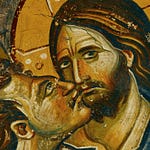
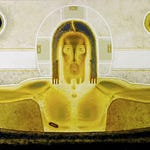
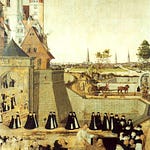
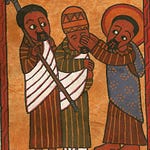




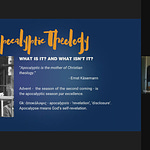


And yet...